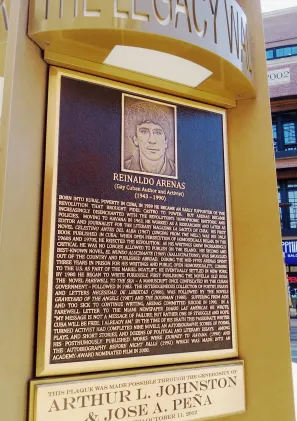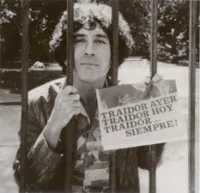Biography
1943 - 1990
“I have always considered it despicable to grovel for your life as if life were a favor. If you cannot live the way you want, there is no point in living”
- Reinaldo Arenas
Born into rural poverty in Cuba, in 1959 he became an early supporter of the revolution that brought Fidel Castro to power. But Arenas became increasingly disenchanted with the revolution’s homophobic rhetoric and policies. Moving to Havana in 1963, he worked as a researcher and later as editor and journalist for the literary magazine La Gaceta de Cuba. His first novel Celestino antes del alba (1967) (Singing from the Well) was his only book published in Cuba. When open persecution of homosexuals began, in the 1960s and 1970s, he rejected the revolution. As his writings grew increasingly critical he was no longer allowed to publish on the island. His second and best-known novel, El mundo alucinante (1969) (Hallucinations), was smuggled out of the country and published abroad. During the mid-1970s Arenas spent three years in prison for his writings and public, open homosexuality. Coming to the U.S. as part of the Mariel boatlift, he eventually settled in New York. By 1980 he began to write furiously, first publishing the novella Old Rosa. The novel Farewell to the Sea – a manuscript once confiscated by the Cuban government – followed in 1982. The heterogeneous collection of poetry, essays and letters Necesidad de libertad (1986), was followed by the novels Graveyard of the Angels (1987) and The Doorman (1988). Suffering from AIDS and too sick to continue writing, Arenas committed suicide in 1990. In a farewell letter to the Miami newspaper Diario las Américas he wrote, “My message is not a message of failure, but rather one of struggle and hope. Cuba will be free. I already am.” By the time of his death this passionate writer turned activist had completed nine novels, an autobiography, scores of poems, plays, and short stories, and dozens of political and literary essays. Among his posthumously published works were Journey to Havana (1990) and the autobiography Before Night Falls (1992) which was made into an Academy-Award nominated film in 2000.
1943 - 1990
“I have always considered it despicable to grovel for your life as if life were a favor. If you cannot live the way you want, there is no point in living”
- Reinaldo Arenas
Born into rural poverty in Cuba, in 1959 he became an early supporter of the revolution that brought Fidel Castro to power. But Arenas became increasingly disenchanted with the revolution’s homophobic rhetoric and policies. Moving to Havana in 1963, he worked as a researcher and later as editor and journalist for the literary magazine La Gaceta de Cuba. His first novel Celestino antes del alba (1967) (Singing from the Well) was his only book published in Cuba. When open persecution of homosexuals began, in the 1960s and 1970s, he rejected the revolution. As his writings grew increasingly critical he was no longer allowed to publish on the island. His second and best-known novel, El mundo alucinante (1969) (Hallucinations), was smuggled out of the country and published abroad. During the mid-1970s Arenas spent three years in prison for his writings and public, open homosexuality. Coming to the U.S. as part of the Mariel boatlift, he eventually settled in New York. By 1980 he began to write furiously, first publishing the novella Old Rosa. The novel Farewell to the Sea – a manuscript once confiscated by the Cuban government – followed in 1982. The heterogeneous collection of poetry, essays and letters Necesidad de libertad (1986), was followed by the novels Graveyard of the Angels (1987) and The Doorman (1988). Suffering from AIDS and too sick to continue writing, Arenas committed suicide in 1990. In a farewell letter to the Miami newspaper Diario las Américas he wrote, “My message is not a message of failure, but rather one of struggle and hope. Cuba will be free. I already am.” By the time of his death this passionate writer turned activist had completed nine novels, an autobiography, scores of poems, plays, and short stories, and dozens of political and literary essays. Among his posthumously published works were Journey to Havana (1990) and the autobiography Before Night Falls (1992) which was made into an Academy-Award nominated film in 2000.
Lesson Plan
Please login or register for an account to view this lesson plan.
Demography
Demography
Gender Male
Sexual Orientation Gay
Gender Identity Cisgender
Ethnicity Latinx
Nations Affiliated Cuba United States
Era/Epoch AIDS Era (1980-present) Cold War (1945-1991) Information Age (1970-present) Post-Stonewall Era (1974-1980)
Field(s) of Contribution
Advocacy & Activism
Art, Music, Literature & Theater
Author
Editor
Journalism
Media & Communications
Poet
Social Justice
Social Sciences
US History
World History
Commemorations & Honors
Cirilo Villaverde National Competition held by National Union of Cuban Writers and Artists
First Honourable Mention For His Novel Hallucinations (1966)
Arena's Biography Before Night Falls Named One of the Ten Best Books of the Year by New York Times (1993)
Demography
Gender Male
Sexual Orientation Gay
Gender Identity Cisgender
Ethnicity Latinx
Nations Affiliated Cuba United States
Era/Epoch AIDS Era (1980-present) Cold War (1945-1991) Information Age (1970-present) Post-Stonewall Era (1974-1980)
Field(s) of Contribution
Advocacy & Activism
Art, Music, Literature & Theater
Author
Editor
Journalism
Media & Communications
Poet
Social Justice
Social Sciences
US History
World History
Commemorations & Honors
Cirilo Villaverde National Competition held by National Union of Cuban Writers and Artists
First Honourable Mention For His Novel Hallucinations (1966)
Arena's Biography Before Night Falls Named One of the Ten Best Books of the Year by New York Times (1993)
Resources
Resources
Béjar, Eduardo C. La textualidad de Reinaldo Arenas. Madrid: Editorial Playor, 1987.
Foster, David William. "Critical Monographs, Dissertations, and Critical Essays about Reinaldo Arenas." Cuban Literature: A Research Guide. New York: Garland Publishing, 1985: 89-91.
Foster, David William. Gay and Lesbian Themes in Latin American Literature. Austin: University of Texas Press, 1991: 66-72.
Hernández-Miyares, Julio, and Perla Rozencvaig, eds. Reinaldo Arenas: alucinaciones, fantasía y realidad. Glenview, Ill.: Scott, Foresman, 1990.
Rozencvaig, Perla. Reinaldo Arenas: narrativa de transgresión. México: Editorial Oasis, 1986.
Schwartz, Kessel. "Homosexuality and the Fiction of Reinaldo Arenas." Journal of Evolutionary Psychology 5, no. 1-2 (March 1984): 12-20.
Soto, Francisco. "Celestino antes del alba: escritura subversiva/sexualidad transgresiva." Revista Iberoamericana 57, no. 154 (enero-marzo 1991): 345-354.
Soto, Francisco. Conversación con Reinaldo Arenas. Madrid: Editorial Betania, 1990.
Soto, Francisco. "Reinaldo Arenas's Literary Legacy." Christopher Street Magazine 156 (May 1991): 12-16.
Soto, Francisco. Reinaldo Arenas: The Pentagonía. Gainesville: University Press of Florida, 1994.
Valero, Roberto. El desamparado humor de Reinaldo Arenas. North Miami: Hallmark, 1991.
Vargas Llosa, Mario. "Pájaro tropical." El País (June 15, 1992): 15-16.
http://www.nytimes.com/1990/12/09/obituaries/reinaldo-arenas-47-writer-who-fled-cuba-dies.html
http://www.americasquarterly.org/content/why-reinaldo-arenas-still-matters-cubas-lgbt-community
https://www.britannica.com/biography/Reinaldo-Arenas
Resources
Béjar, Eduardo C. La textualidad de Reinaldo Arenas. Madrid: Editorial Playor, 1987.
Foster, David William. "Critical Monographs, Dissertations, and Critical Essays about Reinaldo Arenas." Cuban Literature: A Research Guide. New York: Garland Publishing, 1985: 89-91.
Foster, David William. Gay and Lesbian Themes in Latin American Literature. Austin: University of Texas Press, 1991: 66-72.
Hernández-Miyares, Julio, and Perla Rozencvaig, eds. Reinaldo Arenas: alucinaciones, fantasía y realidad. Glenview, Ill.: Scott, Foresman, 1990.
Rozencvaig, Perla. Reinaldo Arenas: narrativa de transgresión. México: Editorial Oasis, 1986.
Schwartz, Kessel. "Homosexuality and the Fiction of Reinaldo Arenas." Journal of Evolutionary Psychology 5, no. 1-2 (March 1984): 12-20.
Soto, Francisco. "Celestino antes del alba: escritura subversiva/sexualidad transgresiva." Revista Iberoamericana 57, no. 154 (enero-marzo 1991): 345-354.
Soto, Francisco. Conversación con Reinaldo Arenas. Madrid: Editorial Betania, 1990.
Soto, Francisco. "Reinaldo Arenas's Literary Legacy." Christopher Street Magazine 156 (May 1991): 12-16.
Soto, Francisco. Reinaldo Arenas: The Pentagonía. Gainesville: University Press of Florida, 1994.
Valero, Roberto. El desamparado humor de Reinaldo Arenas. North Miami: Hallmark, 1991.
Vargas Llosa, Mario. "Pájaro tropical." El País (June 15, 1992): 15-16.
http://www.nytimes.com/1990/12/09/obituaries/reinaldo-arenas-47-writer-who-fled-cuba-dies.html
http://www.americasquarterly.org/content/why-reinaldo-arenas-still-matters-cubas-lgbt-community
https://www.britannica.com/biography/Reinaldo-Arenas






